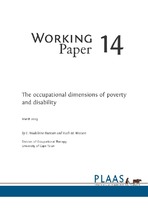| dc.contributor.author | Duncan, Madeleine | |
| dc.contributor.author | Watson, Ruth | |
| dc.date.accessioned | 2019-03-11T09:43:26Z | |
| dc.date.available | 2019-03-11T09:43:26Z | |
| dc.date.issued | 2009-03 | |
| dc.identifier.citation | Duncan, M., Watson, R. (2009). ‘The occupational dimensions of poverty and disability’, Working Paper 14. PLAAS, UWC, Cape Town. | en_US |
| dc.identifier.uri | http://hdl.handle.net/10566/4470 | |
| dc.description.abstract | This paper is based on ongoing research into the form, performance and meaning of all the things that particularly vulnerable people do every day i.e. their occupations. Occupations are the building blocks for livelihood. The relationship between occupation, poverty and disability is explored through the case study of a household with two adult disabled members living in a remote rural village in the Eastern Cape Province, South Africa. The description of their many deprivations illustrates how a scarcity of opportunities, resources and supportive infrastructures influences human development, agency and functioning and is compounded by disability. The concept of occupational poverty depicts the marginalisation of disabled people and their households. A community based rehabilitation approach is recommended as a means for promoting the inclusion and participation of disabled people, their households and the community in development initiatives, through the facilitation of each person's occupational performance. | en_US |
| dc.language.iso | en | en_US |
| dc.publisher | Institute for Poverty, Land and Agrarian Studies, University of the Western Cape | en_US |
| dc.relation.ispartofseries | Working Paper;14 | |
| dc.subject | Disability | en_US |
| dc.subject | Occupation | en_US |
| dc.subject | Eastern Cape | en_US |
| dc.subject | Occupational poverty | en_US |
| dc.title | The occupational dimensions of poverty and disability | en_US |
| dc.type | Working Paper | en_US |

